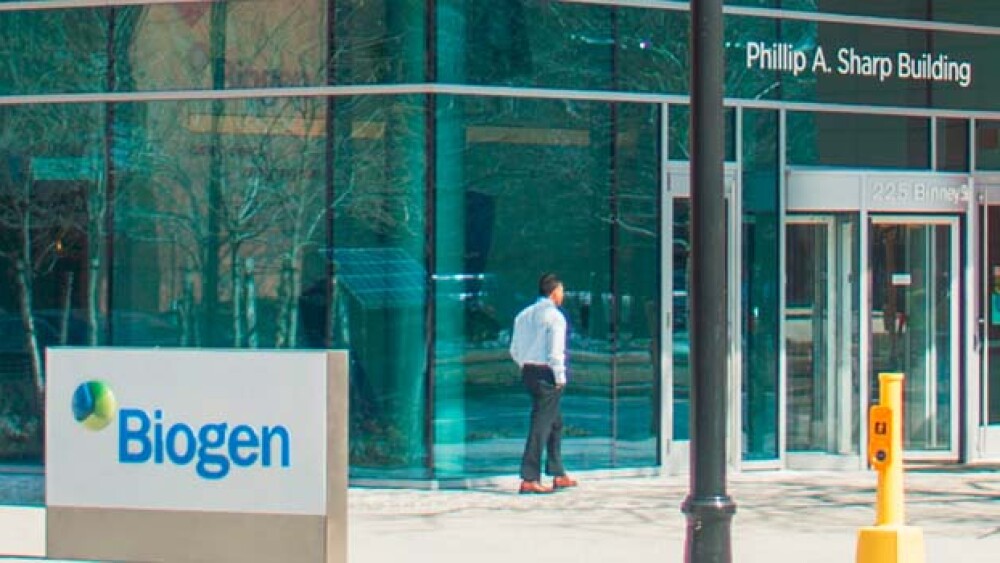Cambridge, Mass.-based Biogen exercised its option to acquire additional shares of South Korea’s Samsung Bioepis. Samsung Bioepis focuses on developing biosimilar drugs and is a joint venture between Samsung Biologics and Biogen formed in 2012.
Cambridge, Mass.-based Biogen exercised its option to acquire additional shares of South Korea’s Samsung Bioepis. Samsung Bioepis focuses on developing biosimilar drugs and is a joint venture between Samsung BioLogics and Biogen formed in 2012.
Samsung Bioepis has a broad pipeline of biosimilar candidates—generic versions of biologic drugs—including six late-stage compounds in immunology, oncology and diabetes.
Under the terms of the deal, Biogen will pay Samsung BioLogics about $700 million for the option shares. This will increase Biogen’s ownership in the company from about 5.4 percent to 49.9 percent. In financial filings by Samsung BioLogics, the call options are valued at about $2 billion.
“We are very pleased with the progress made to date at Samsung Bioepis and believe exercising this option is an opportunity to create meaningful value for our shareholders,” stated Michel Vounatsos, chief executive officer of Biogen. “This option allows us to increase our ownership share in a leading biosimilar company at what we believe are attractive terms. We look forward to building an important relationship with Samsung BioLogics.”
Although Biogen is not typically associated with biosimilars, on October 17, Samsung Bioepis, Samsung BioLogics and Biogen announced the European launch of Imraldi, a biosimilar to AbbVie’s Humira (adalimumab). The significant investment in Bioepsis suggests a much larger interest and possible penetration by Biogen into the biosimilar market, which is strong in Europe, but lags significantly in the U.S.
This summer, the Food and Drug Administration (FDA) announced its Biosimilars Action Plan, which is an effort to increase market accessibility in the U.S. to biosimilars. The plan is an attempt to balance innovation and competition, and includes implementing new FDA review tools, establishing a new Office of Therapeutic Biologics and Biosimilars (OTBB), and providing more clarity and flexibility on analytical approaches to evaluating product structure and function.
At the time, FDA Commissioner Scott Gottlieb stated, “There’s active work underway on bold reforms, like shifting biologics from Medicare’s Part B scheme into a competitively bid system like Part D, where we can take full advantage of price and therapeutic competition. These types of approaches can delink physician reimbursement from drug prices and inject more competition into the market, while increasing the incentives to create the next great innovation that’s going to advance human health.”
The Nikkei Asian Review indicates that the Samsung organization has worked with Biogen on developing its contract drug manufacturing business. Samsung BioLogics completed its third manufacturing plant in October, and will now shift its focus to new drug development, which will be boosted by its relationship with Biogen. Biogen, for its part, increases ties with a “deep-pocketed partner.”
Reuters reports that South Korean regulators are investigating Samsung BioLogics’ bookkeeping in 2015. The regulators will take Biogen’s increased ownership into consideration as the investigation plays out.
Samsung BioLogics in 2015 switched to valuing itself at fair market value instead of book value. This was the result of being treated as an affiliate instead of a unit, but it caused the company’s valuation of Samsung Bioepis to multiply 18-times to about $4.5 billion.
BioLogics has denied any malfeasance, saying the change was necessary to reflect different accounting standards should Biogen exercise its call option—which it did today. It is being investigated by a group within South Korea’s Financial Services Commission (FSC).





